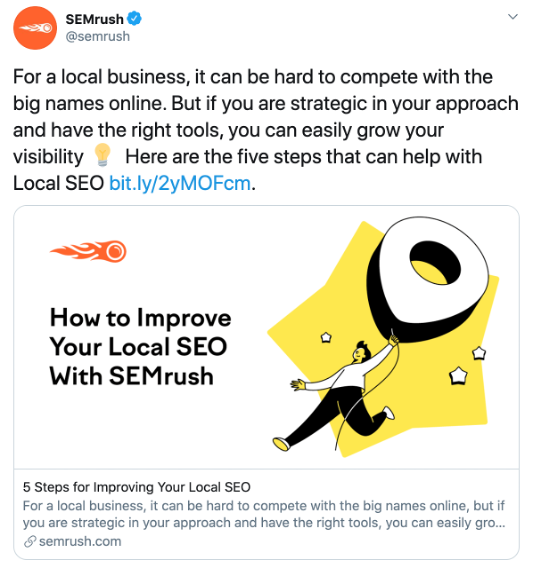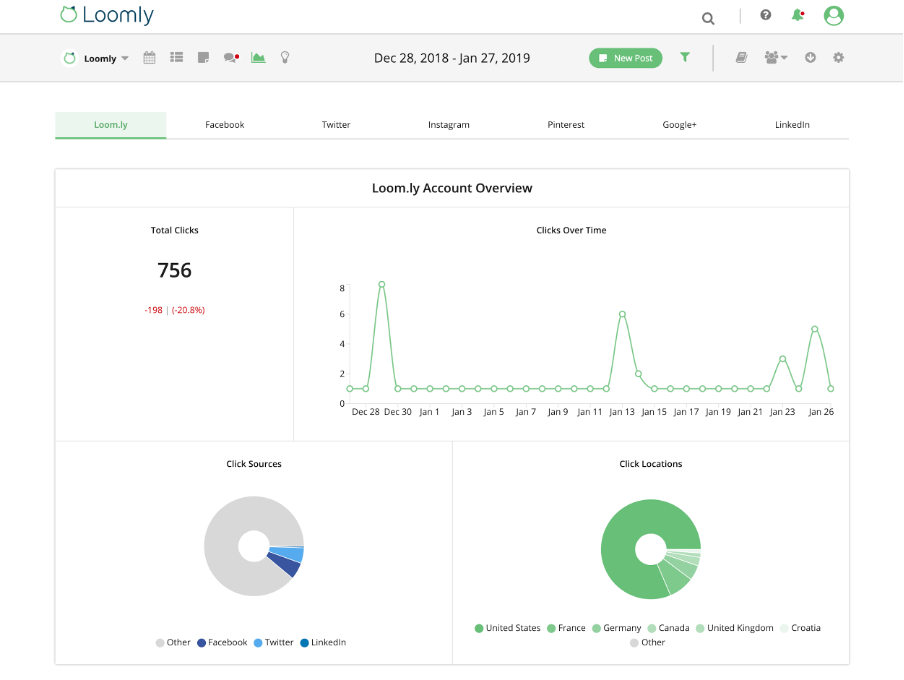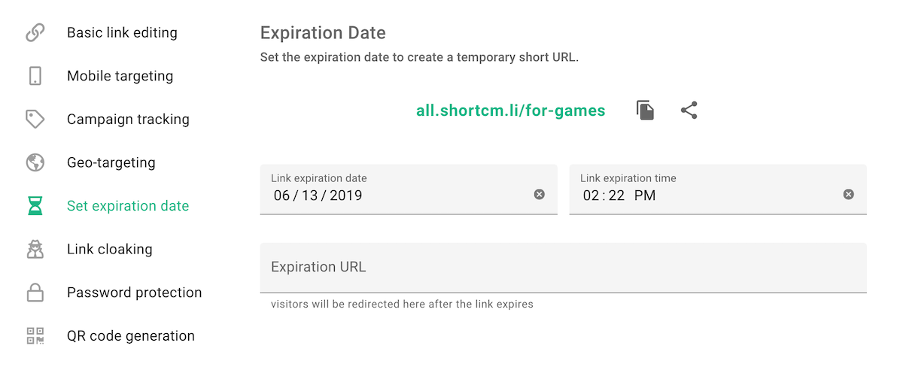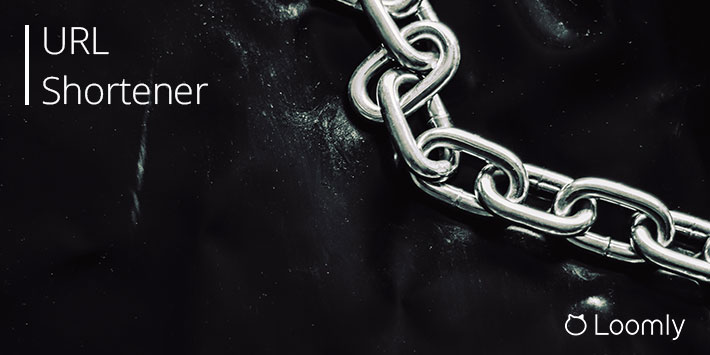URL shorteners are useful tools for everyone, especially digital marketers.
They come in all shapes and sizes, from fast and free for creating links on the go to dedicated click tracking and management dashboards for brands.
But how do they work? And what are the benefits of using one?
In the FAQ below, the Loomly Team answers all your questions about URL shorteners.
Table of contents
- What is a URL shortener?
- What does URL mean?
- What is the difference between a short link, a shortened URL, and a tiny URL?
- Why is it important to shorten URLs?
- Can you track clicks on a shortened URL?
- How does a URL shortener work?
- How do you shorten a URL?
- Can I use UTM parameters with a URL shortener?
- Do shortened URLs expire?
- What are the best URL shorteners?
What is a URL shortener?
A URL shortener refers to a tool that converts a URL (link) that is too long into a more compact version.
URL shorteners are practical for people using marketing strategies such as affiliate marketing and social media marketing, where links that are too long either cannot be displayed or add unnecessary code to a page.

What does URL mean?
URL stands for Uniform Resource Locator.
A URL includes the domain name, plus other information, to create a complete web address or link.

When a user enters a URL, the web browser opens a specific web page. For example, the URL https://www.loomly.com/features takes you to the Features Page on Loomly’s domain https://www.loomly.com/

So, you could say a URL is a set of directions, and every web page has a unique one.
What is the difference between a short link, a shortened URL, and a tiny URL?
They are various expressions referring to the same thing.
Why is it important to shorten URLs?
From a marketing perspective, a shortened URL can help in several ways.
1. Helps make the link more appealing
A long URL can look clumsy, convoluted, and sometimes suspicious. You know the sort:
https://www.amazon.com/b?node=5856181011&tag=twxcmeaxcm-20&ascsubtag=xtw-XCMEMR-1-9-gzerpb4ka6xcnugv&ref_=xtw_XCMEMR_1_9_gzerpb4ka6xcnugv&ref=tsm_1_tw_s__3948261100&linkId=102465203
But by shortening the URL, it’s easier to read, and users are more likely to click something that’s more appealing.
That’s why SEMrush use the Bitly URL shortener, e.g. bit.ly/2yMOFcm

2. Helps with branding
If you use a customized URL shortener, it can help build brand awareness and brand integrity.
Many brands adopt this idea. For example, we use our loom.ly URL shortener:
And Amazon uses their amzn.to URL shortener:
3. Helps to track the number of clicks
Most URL shorteners also provide marketers with extra data like the number, source, and location of clicks.
4. Helps save character space
A URL shortener can save character space on Twitter and other microblogging and messenger sites with limited character space. A shortened URL gives you more room for the rest of your message.
5. Helps prevent typos
If you share a long URL, there’s more chance of someone mistyping the address in their browser. A short URL makes it easy to type, plus it’s more memorable.
Can you track clicks on a shortened URL?
Yes. For instance, Loomly tracks the number, the source, and the location of clicks for you over time through Advanced Analytics.

How does a URL shortener work?
A URL shortener works by using a web server function called a redirect. The short URL redirects to the long URL.
When you enter a shortened URL in your web browser, it sends an HTTP command to the web server, which checks the address and redirects it to the original long URL.
For example, in the SEMrush example above, when someone clicks the short bit.ly/2yMOFcm URL, Bitly uses a 301 redirect and sends them to the “permanent URL” at https://www.semrush.com/blog/get-to-top-local-positions-on-all-devices/
How do you shorten a URL?
You can shorten a URL with a URL shortening service like Bitly or TinyURL.
(See below for our top 15 Url Shorteners).
Can I use UTM parameters with a URL shortener?
Absolutely.
A URL shortener is perfect for shrinking a long and unwieldy URL that contains UTM parameters, like this:
https://blog.loomly.com/brand-purpose-with-laurent-janneau/?utm_source=Blog&utm_campaign=13b8679dcd-EMAIL_CAMPAIGN_2019_02_20_07_55_COPY_01&utm_medium=email&utm_term=0_3ca412ae04-13b8679dcd-149993002
So you end up with a neat, short URL:
https://loom.ly/E9Ze6ig
Do shortened URLs expire?
Some do, and some don’t – it depends on the URL shortener service you’re using.
Some providers claim their shortened URLs don’t expire. For example, TinyURL says its shortened URLs will never expire.
Other services are designed so that a shortened URL will expire after a specified time. For example, Short.io includes a “Link Expiration” feature, where you set the expiration date/time:

What are the best URL shorteners?
Here’s a list of the best URL shorteners:
- Bitly – the best all-round URL shortener.
- TinyURL – fast and free with link customization.
- Tiny.CC – create free, custom short links, and QR codes.
- Rebrandly – lets you create custom-branded links.
- Polr – a minimal self-hosted URL shortener.
- Cuttly – free custom, branded URLs, plus analytics and link management.
- Hyperlink – lets you track links via push notifications.
- T2M – create a short URL and QR code together.
- Yourls – a customizable self-hosted URL shortener.
- Shorby – designed for Instagram’s “one link in bio” rule.
- ClickMeter – optimize marketing links and track clicks.
- Short.io – shorten links using your own domain.
- URL Shortener by Zapier for automatically creating links per Zap.
- Loom.ly – the URL shortener for Loomly users.

Manage all your social media accounts in one place.
Craft, schedule, & auto-post content to all your social channels, then track analytics and manage interactions from a single, easy-to-use dashboard.
URL Shorteners in a Nutshell
A URL shortener service helps you create cleaner, more user-friendly URLs and, in some cases, also allows you to track and analyze how they perform.



